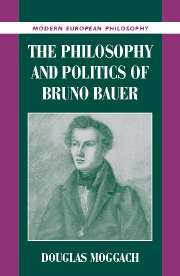Book contents
- Frontmatter
- Contents
- Preface
- THE PHILOSOPHY AND POLITICS OF BRUNO BAUER
- Introduction: “The Friend of Freedom”
- I FOUNDATIONS: AESTHETICS, ETHICS, AND REPUBLICANISM
- II JUDGING THE OLD ORDER
- III THE EMANCIPATORY PROJECT
- IV JUDGING THE REVOLUTIONARY MOVEMENT
- Epilogue: After the Revolution: The Conclusion of the Christian-Germanic Age
- Appendix: Bruno Bauer, “On the Principles of the Beautiful” (1829)
- Notes
- Bibliography
- Index
Epilogue: After the Revolution: The Conclusion of the Christian-Germanic Age
Published online by Cambridge University Press: 05 June 2012
- Frontmatter
- Contents
- Preface
- THE PHILOSOPHY AND POLITICS OF BRUNO BAUER
- Introduction: “The Friend of Freedom”
- I FOUNDATIONS: AESTHETICS, ETHICS, AND REPUBLICANISM
- II JUDGING THE OLD ORDER
- III THE EMANCIPATORY PROJECT
- IV JUDGING THE REVOLUTIONARY MOVEMENT
- Epilogue: After the Revolution: The Conclusion of the Christian-Germanic Age
- Appendix: Bruno Bauer, “On the Principles of the Beautiful” (1829)
- Notes
- Bibliography
- Index
Summary
In Bauer's late judgement, the failure of 1848 attests to the bankruptcy of the European metaphysical tradition, of which, formerly, his own ethical idealism was to have been the culmination. While he continues to proclaim his fidelity to his basic pre-revolutionary insights, his thought undergoes a profound change. He abandons his republicanism, but his abiding anti-liberal stance now induces him to contribute to conservative causes. After 1848 the ethics of perfectionism can no longer be sustained, but the aesthetic idea proves more durable in Bauer's thinking. Something of the metaphysical idea of the unity of thought and being persists, greatly transfigured, in both individual and social forms. Individually, this unity is no longer secured through sublime and ceaseless struggle, but in private self-cultivation, or disinterested aesthetic contemplation of the inevitable processes of cultural decay and regeneration. Socially, after 1848, Bauer looks particularly to Russia as a revivifying force for an exhausted and impotent Europe, sunk under the weight of particularism. Though the European legacy of reform and revolution is pressing upon it, and though he describes it as filled with repugnance for its own shameful and unacknowledged past, Russia unites political and ecclesiastical powers in all-encompassing absolutism. A premodern society now appears to hold out the prospects for a new beginning, as a stimulus to change, if not as a model to be emulated.
- Type
- Chapter
- Information
- The Philosophy and Politics of Bruno Bauer , pp. 180 - 187Publisher: Cambridge University PressPrint publication year: 2003



